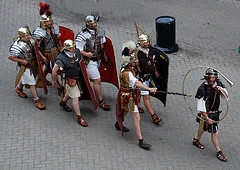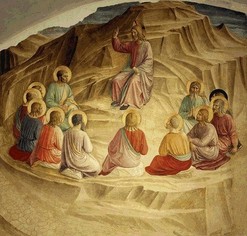|
Jesus's words to the crowds have created quite a debate among scholars since the Greek can be readily read both ways. Before analyzing the grammar and theology, here are few of the modern renderings:
1 Comment
 As a military commander, the centurion understood authority as a man who had it and was also under it, and thus he knew it when he saw it in Jesus. Thus, he “perceives that Jesus likewise both receives and exercises authority” (Elwell, 731), but unlike Roman imperial authority, Jesus “ministered under God's authority and as such was vested with the ability to heal diseases” (Howell, 118). In this we see that the centurion understood the relationship between obedience and authority, that is, those under authority obey those with authority, which is a principle that transcends human governance to the very subordination of the Trinity. However, the centurion also understood the limitations of authority, by means of who he was to obey and who was to obey him. For we certainly don't see the centurion commanding or ordering Jesus to heal his servant, though he could have tried as a Roman occupier of Palestine of which Jesus was a resident. Instead, he recognized that even nature itself was under Christ's authority (Matthew 28:18) and subsequently obedient to him (he may have heard about the healing of the Capernaum official's son) and thus his servant would be healed if Christ would but exercise His authority.  Faith is not complicated. Unlike every other religion (faith) in the world, only Christianity sets the requirements as simple as faith alone. No rituals, sacrifices, practices, or works are required, just faith. This is what we see in the centurion. He is a man who recognized that there was nothing he could do to merit the grace of Christ, for he considered himself to be so unworthy that he could not even stand in Christ's presence. Even though he recognized this divide, or because he recognized this divide, he had complete trust and commitment, faith, in Christ. The fact that a gentile centurion understood this, as evidenced by his simple request free from manipulation and coercion, yet expressed forthright with confidence, while his trained Jewish counterparts did not astonished Jesus (Howell, 118). Jesus found the “qualities celebrated in the Beatitudes” in the Centurion as his faith is both intellectually and practically applied in his unquestioning request for a miraculous healing of his servant from afar (Elwell, 731-32). For his faith, the centurion's servant was healed “that very hour,” but not before Jesus capitalized on it as a teachable moment. “Jesus' healing of the servant anticipates the mission to the Gentiles,” which He foretells in the metaphor of the feast where the seats of Jews who reject Jesus as Messiah are taken by Gentiles due to their faith (Elwell, 732).  Fran Angelico, Sermon on the Mount Sermon on the Mount: After Jesus chose His disciples, He immediately set about the task of deprogramming them of all the layers of the Mishnah and manmade laws that had encrusted the word of God, and His Kingdom. So He took them up on a mountainside to a level place by the Sea of Galilee. Crowds begain to gather and listen in as well (many came from far away for healing and his teachigns) as Jesus then delivered the greatest sermon ever preached. The central theme of His sermon was delivered within the context of the Kingdom of Heaven/God beginning with the beatitudes and the heart of a disciple. Here He delivered the programmatic passage in Matthew 5:17-20 to unlock the entire sermon.  Copenhagen, Sermon on the Mount Sermon on the Mount: Are Cultural Christians really Christians? Are self-proclaimed believers, prayed the prayer when I was in third grade but haven't done anything about it since, truly saved? Are these Christian Atheists who say they believe God exists, but live like He doesn't, guaranteed to inherit the kingdom or eternal judgment?  “To seek” God means: total unbridled commitment, blatantly obssessive pursuit, unreserved loyalty, and unashamed devotion. In a seemingly contradictory way, we are to “enslave” ourselves to God - not at our expense, but to our profit. By giving up everything to find God, we gain everything only to find that what we relinquished we could not keep and what we aquired we cannot lose. We sell what is worthless in order to acquire that which cannot be valued. We give up our lives in pursuit of God and in return we not only find Him who we sought, but are given a life worth living and, far better, life eternal. Thus, by whatever means, through His word, through His gifts, through His presence, we are to commit all our energies to restoration with our Father. In short, if we make God our sole desire and seek Him earnestly with all our hearts, then He will give Himself to us and we shall be rewarded with that which we seek. |
AuthorBrett Yardley: Categories
All
Archives
January 2019
|


